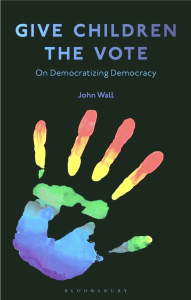New York: Bloomsbury, November 2021
Throughout history, the right to vote has been extended to landowning men, the poor, minorities, women, and young adults. In each case, the meaning of democracy itself has been transformed. The one major group still denied suffrage is the third of humanity who are under 18 years of age. However, children are becoming increasingly active in political movements for climate regulation, labor rights, gun control, transexual identity, and racial justice. And these have led to a growing global movement to eliminate minimum ages of enfranchisement.
This book argues that it is time to give children the vote. Using political theory and drawing on childhood studies, it shows why suffrage cannot legitimately be limited according to age, as well as why truly universal voting is beneficial to all and can help save today’s crumbling democratic norms. It carefully responds to a wide range of objections concerning competence, knowledge, adult rights, power relations, harms to children, and much more. And it develops a detailed childist theory of voting based on holding elected representatives maximally responsive to the people’s different lived experiences. The book also introduces the concept of proxy-claim voting, wherein parents or guardians exercise proxy votes for non-competent persons, both child and adult, until whatever time those persons wish to claim or reclaim the exercise of their vote for themselves. Ultimately, the book maps out a new vision of democratic voting that, by equally empowering children, is at last genuinely democratic.
Contents
Introduction
1. Voting over History
2. Competence
3. Knowledge
4. Power
5. Outcomes for Children
6. Outcomes for Societies
7. The Proxy-Claim Vote
Manifesto
Reviews
“Future generations will ponder why children were for so long denied the right to have their views represented at the ballot box, just as we wonder why societies argued against the right of women and people of colour to vote. Professor John Wall has written a scholarly work that is also a gripping read.” ―Neena Modi, Professor of Neonatal Medicine, Imperial College London, UK
“Is it time to give children the vote? In a nuanced, deeply thought and challenging way, this book combines political theory and childhood studies and demonstrates why the constraining of suffrage rights according to age can be profoundly problematic. It undercuts simplistic comprehensions about adult voting rights, competence, knowledge and how age structure power relations. John Wall extends the argument to a claim for proxy voting for all children. It contains both a vision of how proxy voting can help to redeem deteriorating democratic values and an insightful and novel social critique. This book will stimulate new thinking in a wide range of areas and deserves a broad audience among academic scholars, politicians, activists for extension of voting rights – simply anyone interested in the future of our democracies.” ―Bengt Sandin, Professor Emeritus of Child Studies, Linköping University, Sweden
